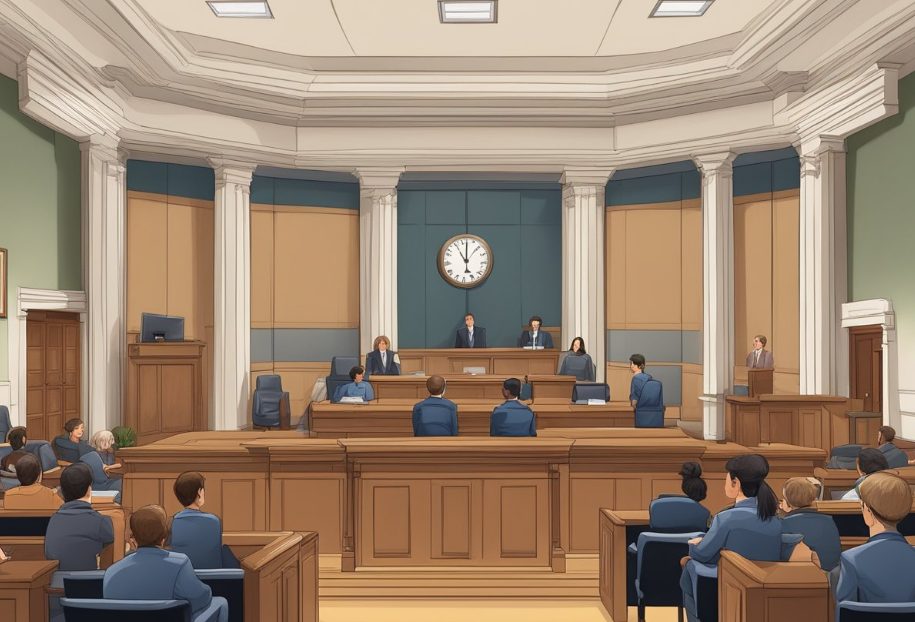How To Choose The Right Federal Law Firm For Your Legal Needs

Are you looking for the right federal law firm to handle your legal needs? With so many options available, it can be difficult to know where to begin. The key is to do some research and find the best fit for your situation. It’s important to understand what a federal law firm can provide and how it might differ from other types of firms. This article will provide some tips on how to choose the right federal law firm for your legal needs.
A federal law firm focuses on the laws and regulations of the United States government. This type of firm handles cases related to federal law, such as civil litigation and criminal defense. An excellent federal law firm should have experience representing clients in many different areas of the law, including constitutional rights, immigration, labor and employment, intellectual property, product liability, and more. If you are engaged in a particular case, there is a great overview of criminal intent, law enforcement correlations, and federal court procedures that your firm should be able to provide.
Factors to Consider When Choosing a Federal Law Firm
When looking for a federal law firm to represent your legal needs, there are certain factors that you should consider. These include the experience and expertise of the attorneys, the fees they charge, and the reputation of the firm in the legal community. Here are some tips on choosing a federal law firm:
1. Type of Services Offered by the Firm
A good federal law firm should be able to provide services that match your particular legal needs. They should also have a good understanding of the specific laws and regulations related to your case. Most of the common legal services include civil and criminal defense, immigration and labor matters, intellectual property protection, corporate law, and more.
2. Reputation and Experience of Lawyers in the Firm
It’s important to choose a federal law firm with experienced attorneys who are knowledgeable in the specific areas of the law related to your case. You should ask for references and look up reviews online before making your final decision. If they handled a successful case in the past, they are more likely to do the same for your legal needs. For instance, if you are looking for burglary lawyers, you must check their past cases on similar crimes.
3. Level of Accessibility to Client Services
When you are dealing with a federal law firm, it’s important to have access to their client services. This means that your Chicago employment lawyers should be available for consultation and provide timely updates on the progress of your case. During the initial consultation, you should ask about the firm’s availability and how often they communicate with their clients.
4. Financial Considerations
Before signing on with a federal law firm, you should understand its fee structure and determine if it is within your budget. Some firms may offer discounted rates or payment plans to make legal services more affordable. You should also ask about the availability of any grants or scholarships that could help offset the cost of representation.
5. Location of the Firm
You should also consider the location of the federal law firm. It’s important to have easy access to your lawyer, especially if you need to attend in-person meetings or court appearances. If a local firm isn’t an option, look for one that has experience representing clients in your area.
Once you have chosen a firm, it’s important to establish a good working relationship with them. This will help ensure that your case progresses smoothly and efficiently.
Importance of Working With an Experienced Federal Law Firm
Experienced federal law firms offer invaluable expertise and resources to those who are dealing with a legal issue or looking for advice on navigating the complexities of the legal system. Working with an experienced federal law firm can provide peace of mind and protection from potential legal complications. Here’s the list of key benefits of using an experienced federal law firm:
1. Ensure Your Case Is Handled Professionally: Working with a federal law firm can ensure that your case is handled professionally and with the utmost care. They know the laws and regulations surrounding your case, and they have the resources to help you achieve a favorable outcome.
2. Protection from Potential Legal Risks: An experienced federal law firm can help protect you from potential legal risks. They can ensure that all the paperwork is filed correctly and within the required timelines, and they can provide advice on how to proceed with your case.
3. Access to Resources and Expertise: A federal law firm can provide access to resources such as legal research databases, investigative services, expert witnesses, and more. This can be particularly valuable if your case involves complex legal issues that require specialized knowledge or resources.
4. Provide an Objective View of Your Case: An experienced federal law firm can provide an objective view of your case and offer advice on how to proceed. They will be able to identify potential risks, guide you through the intricacies of the legal system, and help ensure that your case is handled properly.
5. Increased Chances of a Favorable Outcome: Working with an experienced federal law firm can increase your chances of achieving a favorable outcome. They have the resources and expertise to help you navigate the complexities of the legal system, which can simplify the process and improve your chances of getting the result you desire.
Tips for Working With a Federal Law Firm on High-Value Cases
In most cases, it is important to exercise caution when dealing with high-value cases and make sure that your interests are properly represented. Here are some tips for working with a federal law firm on high-value cases:
1. Understand the Scope of Your Case: It’s important to be aware of the scope of your case and ensure that you are comfortable with the services offered by your federal law firm. Ask questions, research their experience in similar cases, and make sure that all parties involved understand the legal parameters of your case.
2. Communicate Clearly and Be Upfront About Your Expectations: Communication is key when working with a federal law firm. Clearly explain your goals and objectives for the case and make sure that everyone involved is on the same page. Be upfront about your expectations, budget, and timeline so that everyone can plan accordingly.
3. Have a Written Agreement: Have a detailed written agreement that includes all of the key details relating to your case. This ensures that everyone is clear on the terms and conditions of the representation, fees, timeline, and any other relevant information.
4. Establish Clear Deadlines: Establish clear deadlines and discuss with your federal law firm how often you will be updated on the progress of your case. This helps ensure that everyone involved is working together and can plan accordingly.
5. Trust Your Instincts: Ultimately, you should trust your instincts when working with a federal law firm. If something doesn’t feel right or if you have any doubts about the representation, don’t hesitate to speak up and address your concerns promptly.
Working with an experienced federal law firm can be highly beneficial in many cases, especially when it comes to high-value cases that require specialized knowledge and resources. Moreover, you can’t put a price on the peace of mind that comes from knowing you have the resources to help you achieve a favorable outcome. By following these tips, you can ensure that your case is handled properly and you are represented fairly.
Why Hiring a Lawyer Is Worth the Investment
You may think that getting help from a federal law firm is too expensive and not worth the cost. However, this could be a costly mistake in the long run. Working with an experienced federal law firm can provide invaluable expertise, access to resources, and protection from potential legal risks that you wouldn’t otherwise have. Additionally, some federal law firms offer payment plans or contingency fees to help make the cost of their services more feasible.
Hiring a lawyer is an investment in your case and can be well worth the cost if it results in a favorable outcome. Ultimately, enlisting the expertise of a federal law firm can ensure that your case is handled professionally and that you have every opportunity for success.
In Conclusion
If you are charged with a high-value case, it is important to ensure that your interests are properly represented. Working with an experienced federal law firm can provide invaluable expertise, resources, and protection from potential legal risks that you wouldn’t otherwise have. It is never a bad idea to invest in the services of a federal law firm when dealing with any type of legal matter, especially ones of high value. With a knowledgeable lawyer on your side, you can rest assured knowing that you have the resources to help achieve a favorable outcome in your case.
Additionally, being able to hire a reliable lawyer is an important step in protecting and preserving your rights. No matter what type of case you are facing, enlisting the help of an experienced federal law firm is always worth the investment.
Additional:













